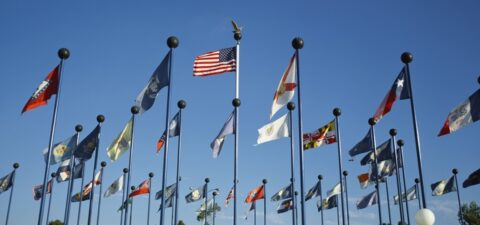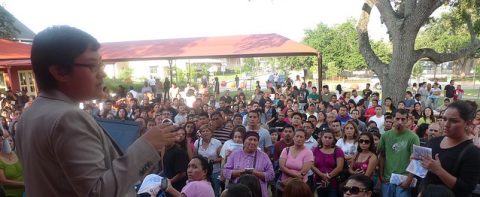Reform

Building Bipartisan Bridges in Congress for High-Skilled Immigration and Entrepreneurship
Tomorrow, the House of Representatives will hold a hearing to discuss, “Enhancing American Competitiveness through Skilled Immigration.” The hearing is likely to highlight both the bipartisan support for high-skilled immigration reform, and a series of new bills that would increase the supply of STEM visas. Read More

Immigration Policy in the States: A Roundup
As Congress begins to debate how to overhaul the nation’s immigration laws on the federal level, state governors who previously staked out anti-immigrant positions are quieter. And in a change from previous years, few measures that mimic provisions of Arizona’s SB-1070 have been proposed in state legislatures. That’s not to say there isn’t still some anti-immigrant legislation bubbling up in states. In Mississippi, for example, a bill to strengthen enforcement of the mandatory E-Verify was introduced but died in the House, however a measure to prevent undocumented immigrants from purchasing public lands is still pending in the Senate after the House passed it. Read More

Skilled Immigrants Filling U.S. Health Care Needs
As the debate around immigration reform continues one of the cornerstones of ongoing discussions is what kinds of skilled immigrants the U.S. needs. There is no doubt that high-skilled immigrants play an important role in America’s innovation economy, and particularly in those industries agglomerated in the Silicon Valleys and Research Triangles of the United States. However, it’s important to remember that high-skilled immigrants play a host of other critical roles in our society, namely in our healthcare industry. As the country’s population grows—and grows older—there is a large gap that can continue to be filled by immigrant primary-care/family practice physicians, nurses, and other healthcare workers. Read More

Business and Labor Announce Breakthrough on Immigration Reform
One of the most contentious issues that has stymied past immigration reform proposals is the divide between business and labor over how many and under what conditions the U.S. should admit new immigrants into our labor force. Also known as the “future flow” issue, the conflict lies in the tension between business’ desire to recruit foreign workers and labor’s desire to ensure workforce protections for those working in the U.S. Read More

Reaching the Six-Month Mark on Deferred Action for Childhood Arrivals (DACA)
The Department of Homeland Security has issued its latest data on the Obama Administration’s initiative that offers deferment from deportation and temporary work permits to young undocumented immigrants under the Deferred Action for Childhood Arrivals (DACA) initiative. In the first six months of the program (August 15–February 14), 423,634 out of the roughly 936,933 immigrants between the ages of 15 and 30 who might immediately meet the requirements, have had their applications accepted for processing. In other words, approximately 45% of those potentially eligible for the program have applied in the first six months. In addition, since February, 199,460 individuals have been approved for DACA and will receive two-year temporary work permits. Read More

Putting the White House Immigration Reform Proposal into Perspective
Over the weekend, the press reported on a leaked draft of portions of the White House’s immigration proposal, and the coverage since then has been largely a frenzied discussion of whether the leak will kill Senate negotiations. There shouldn’t be much chance of that, given the immense pressure on the Senate to not only come up with a proposal, but actually draft legislation that can be debated and voted on this year. Now that at least some of the Administration’s ideas are out in the public eye, it’s useful to treat them as what they are: basic discussion points on what might be in an eventual bill. In the long run, the draft proposal may help to encourage the constructive conversation that the Administration has sought to have on reform. Read More

Senate Likely Will Pass Expanded Violence Against Women Act Today
Senate Judiciary Chairman Patrick Leahy (D-VT) promised that the Violence Against Women Act (VAWA) would be the first bill he pushed in the 113th Congress after the House failed to vote on a version of VAWA that the Senate passed last year. The Senate version expanded protections for immigrant, LGBT, and Native American victims, which House Republicans opposed. Instead, the House passed a bill that failed to expand important protections and even rolled back protections for immigrants that have existed for decades. Ultimately, Congress failed to reauthorize the law, making it the first time since VAWA went into effect in 1994 that the measure to protect domestic violence victims had been allowed to expire. Read More

Survey: Asian Americans Concerned with Legalization, Family Backlogs
In the current debate, immigration is often depicted as a Latino issue. This is partially because just over half of America’s foreign-born population is from Latin America and the Caribbean, and the current political climate around immigration is largely seen as being driven by Latino turnout for Democrats in the 2012 election. But this depiction glosses over the millions of immigrants – documented and undocumented – who hail from other parts of the globe. Read More

House Republicans Show Uncertainty About Where the Party Stands On Immigration
For six hours on Tuesday, the Republican-controlled House Judiciary Committee tried to come to terms with a new landscape on immigration reform and where House Republicans will fit into the picture. Despite attempts by committee leadership to paint an earned path to citizenship as an extreme option and questions about whether citizenship was even necessary, there were signs of common ground, signaling opportunities for breaking the logjam on immigration in the House. Read More

New Report Shows That Border Benchmarks Already Have Been Met
As the components of what should be included in an immigration reform bill take shape, border security, along with enforcement, is proving to be a key part of the framework. Eight senators released a bipartisan proposal earlier this week that included a path to citizenship for the 11 million unauthorized immigrants currently living in the United States. The catch is that implementation of this provision is “contingent upon our success in securing our borders and addressing visa overstays.” The day after the senators presented their framework, President Obama laid out his vision of what should be included in immigration reform legislation during a speech to labor leaders in Nevada. The president called for a clear path to citizenship that’s not contingent on securing the border, but he said the nation needs to stay focused on immigration enforcement. “That means continuing to strengthen security at our borders,” Obama said during his speech. “It means cracking down more forcefully on businesses that knowingly hire undocumented workers.” Read More
Make a contribution
Make a direct impact on the lives of immigrants.
